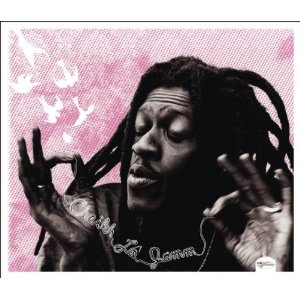In order to make this album reach far beyond his home in Senegal, the singer, drummer and guitarist construes beautiful pieces of music from rhythms of all corners of Africa and the Americas. They carry a powerful message of peace -- that’s the meaning of “Jamm” in Wolof, a language spoken in Senegal.
It would be a waste to give this work a casual listen. It was conceived to be really experienced, starting with the leaflet, where all the lyrics earn a personal commentary by Lô – indispensable when the message passed forth is being sung in four different languages, including Bambara, a dialect spoken in his native Burkina Faso. Lô, who is a member of a spiritual sect founded on the precepts of Islam and Sufism, lets his spirituality shines through the songs that follow a new tradition of praising focused on social-political matters rather than an abstract entity. In his lyrics there’s room for an informal class about life in Africa and,in the strive to approach serious issues with a hopeful, good humored tone,a lesson on positivity to us, whining westerners.
Lô’s didactic approach to many subjects is always balanced with a warm, light delivery. Built on Mandingo and Congolese musical influences, “Il n'ést jamais trop tard” warns youths in Africa that seeking a better life in Europe can be an illusion but it plays so softly that those who dismiss their mother’s advice might actually pay attention this time. When he sings, you can tell it’s always personal. He draws part of the repertoire from his own past also crafting a unique version of songs that mean a lot to him.
Jamm isn’t as upbeat as the infectious Lamp Fall (2006) and also draws less on the American and 70’s Nigerian funk that made Bambay Gueej (1999) so exciting and danceable. Nonetheless, Lô’s fans will be on familiar ground: the Cuban rhythms that were such a big influence on Africa in the 60’s are heavily present along other long-time influences like reggae and, of course, his own softer kind of mbalax, a percussion-driven dance style very popular in Dakar.
At once husky and smooth, Lô’s voice is versatile enough to evoke the praise-singing tradition of the Sufis in Senegal while also incarnating radically different personas ranging from the most devoted flamenco singer to a Cuban salsa veteran or a Malian vocalist. Whatever he sings though, its Cheikh Lô, you know it. And the world is just short of singers like these, who can sew different styles together while maintaining a strong personality.
Mostly acoustic, this album has no excesses, but doesn’t leave any space for more either. Cheikh Lô’s voice mingles with the other instruments in a closed, perfectly attuned circuit where every instrument matters (the harmonious arrangements only gain from the mixing). His background as a multi-instrumentalist and singer guarantee that he’s in total control of the sound he wants. Even though his rhythmic blends never quite sound innovative, Lô’s doing what he does best: constructing sound landscapes so precise they lead you into his own version of Africa -- a place with hardly any boundaries where people carry peace within themselves. No matter which are your religious beliefs or even in the absent of any, Jamm will bring you peace of mind, at least during its enlightened 40 minutes.









